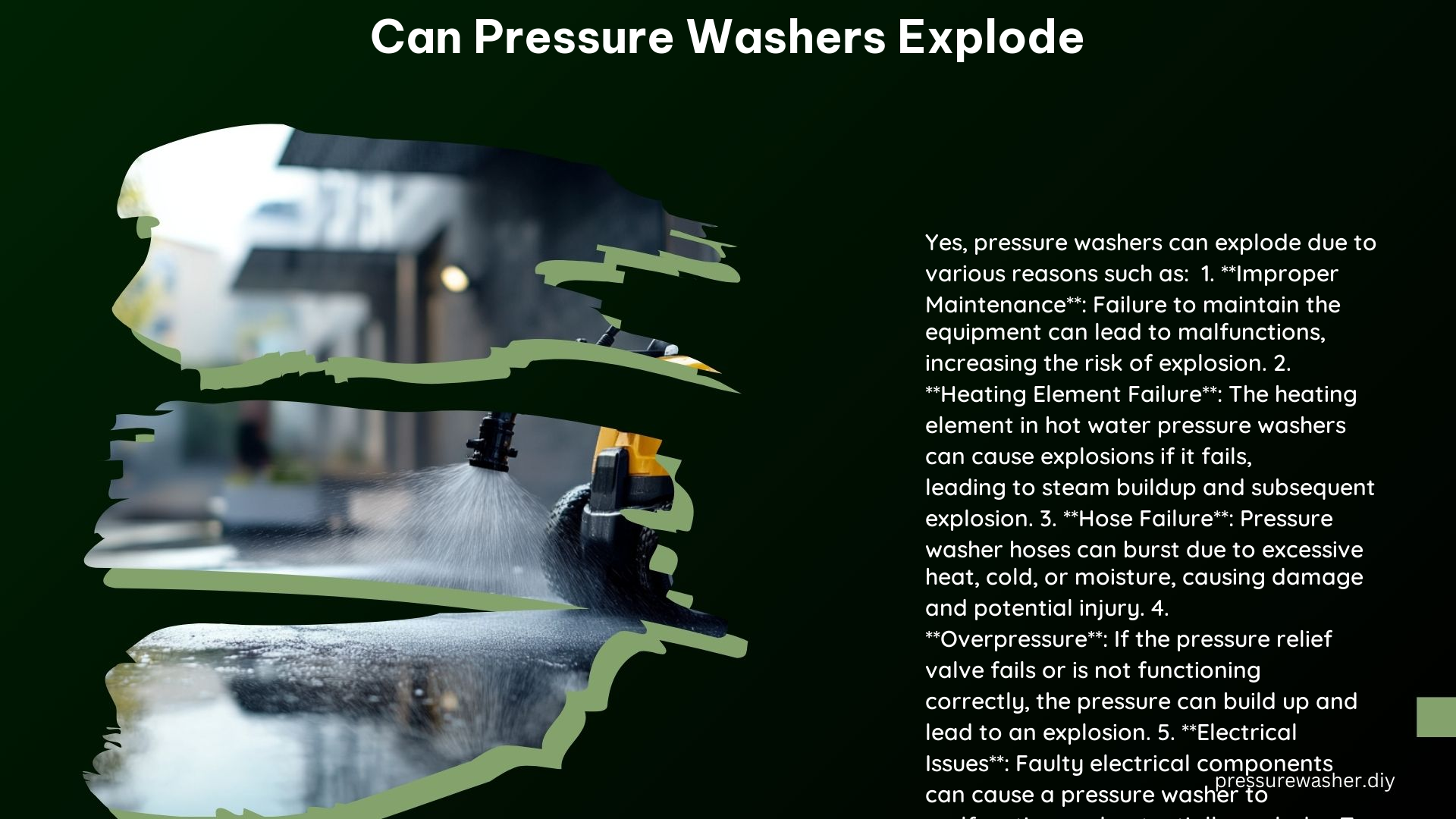Pressure washers are powerful cleaning tools that can make quick work of tough grime and dirt, but they also come with inherent risks. While it is highly unlikely for a properly maintained and operated pressure washer to explode, the potential does exist under certain conditions. This comprehensive guide will delve into the technical details and safety considerations surrounding the potential for pressure washers to explode.
Can a Pressure Washer Machine Explode?
Yes, pressure washers can potentially explode, though the likelihood is relatively low if the equipment is properly maintained and used as intended. The key factors that can contribute to a pressure washer explosion include:
-
Neglect of Maintenance: Ignoring regular maintenance and upkeep of the pressure washer’s components, such as the pump, hoses, and fittings, can lead to equipment failure and increase the risk of an explosion.
-
Improper Use: Misusing the pressure washer, such as using the wrong type of hose, exceeding the recommended pressure or flow rate, or not following the manufacturer’s operating instructions, can also increase the risk of an explosion.
To mitigate the risk of explosion, specialized explosion-proof pressure washers are designed for use in hazardous environments. These models feature heavy-duty, sealed enclosures and meet safety standards such as the National Electric Code (NEC) and OSHA regulations for Class 1, Division 1 and 2, Group C and D environments.
Requirements for a Pressure Washer to Explode

For a pressure washer to explode, several key factors must be present:
- Neglect of Maintenance:
- Failing to regularly inspect and maintain the pressure washer’s components, such as the pump, hoses, and fittings, can lead to wear, damage, and potential failure.
-
Neglecting to replace worn or damaged parts can compromise the structural integrity of the system, increasing the risk of an explosion.
-
Improper Use:
- Using the wrong type of hose or accessory that is not rated for the pressure washer’s operating pressure can cause the hose to burst or the accessory to fail.
- Exceeding the recommended pressure or flow rate can put excessive strain on the system, leading to potential failure and explosion.
- Not following the manufacturer’s operating instructions and safety precautions can also contribute to the risk of an explosion.
Relieving Pressure from the Pump to Prevent Explosion
To prevent the risk of a pressure washer explosion, it is essential to properly maintain the equipment and relieve pressure from the pump when the machine is not in use. Here are the key steps to take:
- Proper Maintenance:
- Regularly inspect the pressure washer’s components, including the pump, hoses, and fittings, for any signs of wear or damage.
- Replace worn or damaged parts promptly to maintain the structural integrity of the system.
-
Follow the manufacturer’s recommended maintenance schedule and procedures to ensure the pressure washer is in optimal working condition.
-
Draining the System:
- Before storing the pressure washer, especially in cold weather, it is crucial to drain the system of any remaining water.
-
Allowing water to freeze in the pump or hoses can cause damage and increase the risk of an explosion.
-
Proper Operation:
- Always follow the manufacturer’s guidelines and safety precautions when operating the pressure washer.
- Ensure the pressure washer is used within its recommended pressure and flow rate limits.
- Use only accessories and hoses that are rated for the pressure washer’s operating specifications.
Technical Specifications
Pressure washers can operate at high pressures and flow rates, which contributes to their cleaning power but also increases the potential for explosions if the equipment is not properly maintained and used.
- Explosion-Proof Models:
- Specialized explosion-proof pressure washers are designed for use in hazardous environments, such as those with the presence of flammable gases or vapors.
-
These models feature heavy-duty, sealed enclosures and meet safety standards such as the National Electric Code (NEC) and OSHA regulations for Class 1, Division 1 and 2, Group C and D environments.
-
Pressure and Flow Rates:
- Pressure washers can operate at pressures ranging from 1,000 psi to as high as 3,100 psi.
- Flow rates can vary from 1.0 GPM to 5.0 GPM, depending on the model and intended use.
- The combination of high pressure and flow rate can put significant strain on the pressure washer’s components, increasing the risk of an explosion if the equipment is not properly maintained.
